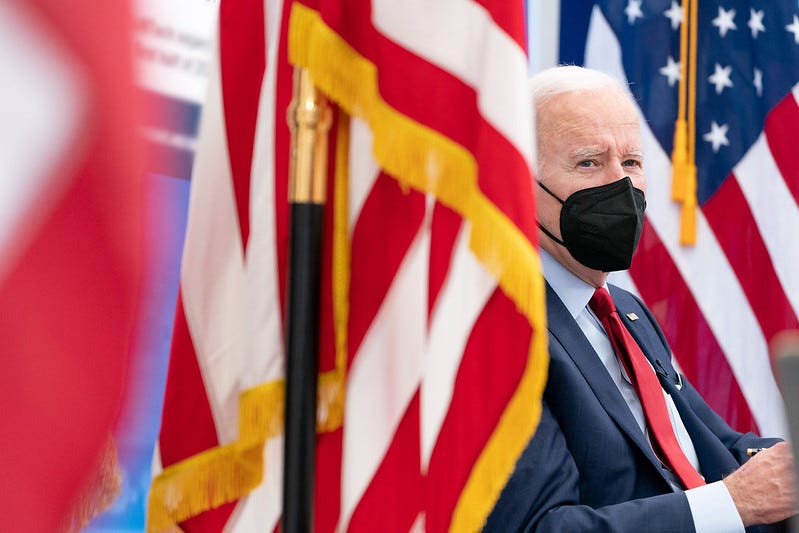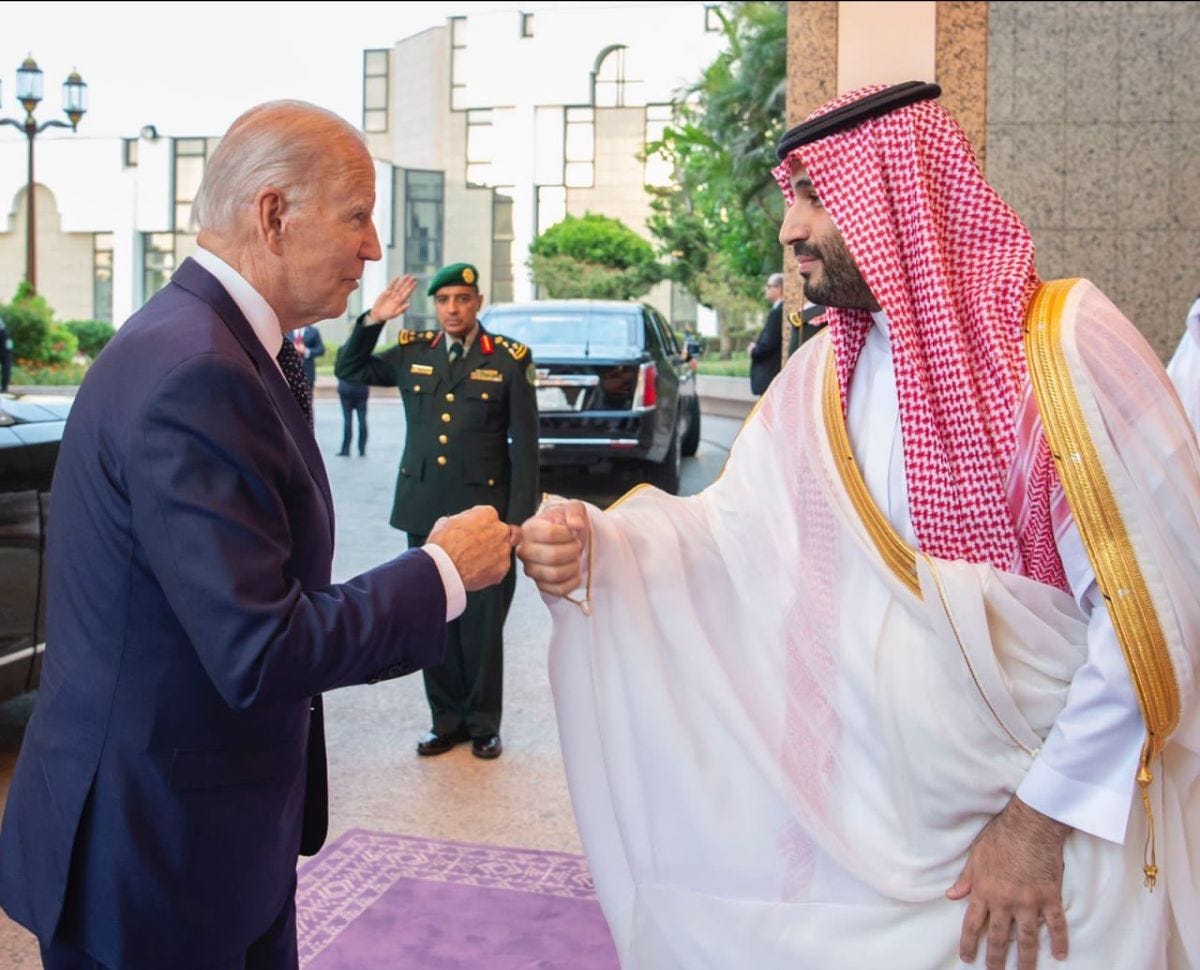Wake Up To Politics - July 18, 2022
Wake Up To Politics: The hands-off presidency
by Gabe Fleisher
Good morning! It’s Monday, July 18, 2022. Election Day 2022 is 113 days away. Election Day 2024 is 841 days away.
Analysis: The hands-off presidency
President Biden’s approval rating has once again reached historic lows, and his legislative agenda has once again imploded, and there are two quotes from this weekend that help explain why:
“I didn’t negotiate with Joe Manchin. I have no idea.” — President Biden, speaking to reporters, in response to the West Virginia senator sinking his climate plan.
“So many young girls, my own grandchildren included, went up to the Supreme Court and marched. I say, ‘Okay, good for you. But what are you going to do next? You feel good about yourself because you voiced your opinion but what are you going to do next? What is your plan?’” — First Lady Biden, at a fundraiser, in response to protests over the end of Roe v. Wade.
The first quote features a president who campaigned as the consummate congressional dealmaker admitting he played no role in negotiations over his legislative agenda.
The second features his wife demanding that young women come up with a plan to protect abortion rights, despite being married to the world’s most powerful person, who has been criticized for barely putting forward a plan of his own on the same topic.
Together, these accidental admissions from the First Couple lay bare one of the central dynamics of the Biden presidency: He has frequently absented himself from it, content to allow the action to be driven by events and other individuals.
“He had so many hopes and plans for things he wanted to do,” the first lady said of her husband at the same weekend fundraiser, “but every time you turned around, he had to address the problems of the moment.”
She meant it is a defense — but it does not paint a flattering picture of the commander-in-chief, constantly chasing the ball, forever at the mercy of what’s going on around him.
The after-the-fact scramble has become the most familiar crouch to find the Biden administration in. It was there during the infant formula shortage, when Biden professed that his aides did not inform him of the crisis until it was two months too late.
And it has been evident throughout the inflationary surge, which Biden insisted was at its “peak” last December, and each successive wave of Covid (“We didn’t see Delta coming,” in the words of the vice president. “We didn’t see Omicron coming.”)
The most obvious example has been the squashing of Roe v. Wade, which was not only entirely predictable because of the makeup of the Supreme Court — but also completely forecasted by the decision’s leak ahead of time to Politico.
But still, even with a month’s worth of lead time, Biden was caught flat-footed by the ruling, still deciding — always deciding — on his response. It would take another two weeks before he issued a limited executive order, mystifying Democrats who couldn’t understand why he didn’t have more aggressive steps ready to be unveiled when the decision was handed down.
“Who would have ever thought about what happened [with the decision on] Roe v. Wade?” the first lady asked this weekend, another intended defense perhaps better left unsaid. “Well, maybe we saw it coming, but still we didn’t believe it.”
And so Biden dithered — just as he has been dithering for months on student loan forgiveness, just as he dithered on whether to run for president at all: in 2020, but also in 1988, as captured in the campaign classic “What It Takes.” (Page 261: “Would he run? Never did say that whole night...”)
This has been the theme as he has ping-ponged from inflation to guns to abortion to several other issues of the moment, perennially promising some future action but hesitant to go much farther.
As the Associated Press noted this morning: “Throughout this century, presidents have often pushed aggressively to extend the boundaries of executive power. Biden talks more about its limits.”
This past week, events drove Biden all the way to Saudi Arabia, where he was photographed giving a chummy fist bump to Crown Prince Mohammed bin Salman, whom he not long ago promised to transform into a “pariah” for ordering the assassination — and mutilation via bone saw — of Washington Post journalist Jamal Khashoggi.
And yet, there Biden was with the supposed “pariah,” tapping fists. If you read between the lines of the explanations issued by his advisers, you can hear a familiar ring: He had to do it. The trip was made necessary, they said, because outside events had once again forced their hand (in this case, rising gas prices — or “Putin’s price hike,” in the White House’s blame-shifting parlance.)
Biden, however, received no immediate oil deal out of the trip — even as the crown prince got the instant credibility boost that comes with a presidential fist bump.
By all accounts, Biden himself was hesitant to make the Saudi trek. The presidency “should stand for something,” he reportedly told advisers behind closed doors. Apparently, he was persuaded otherwise. (“Why don’t you guys talk about something that matters?” he groused this weekend to reporters who pressed him on the fist bump.)
The trip was not only scheduled despite his pushback, it was also rescheduled because of his age. According to the New York Times, the journey was originally going to be tacked onto last month’s trip to Europe, until aides decided it was “crazy” to put a 79-year-old through such a marathon of travel.
Biden’s age creeps uncomfortably in the shadows of any critique of his administration, only recently beginning to break into mainstream fora like the pages of the Times as it has caused some Democrats to look anywhere else for 2024 (anywhere, that is, except towards his handpicked successor).
Republicans have sought to use his status as the nation’s oldest-ever president to make the case that Biden is some sort of puppet, being controlled by the likes of “Prime Minister Klain,” his influential chief of staff, or “President Manchin,” the all-powerful senator.
It is an allegation with long roots in presidential history: indeed, the indelible image of a magician behind the curtain in the “Wizard of Oz” is supposedly modeled after William McKinley and his political patron, Mark Hanna.
There is no evidence to support this narrative about Biden, of course, but the White House does itself little favors when aides repeatedly contradict him or shield him from reporters — or even from engaging in the dealmaking that he sees as his forte.
For each of these points, surely, the White House has a response at the ready. Biden has given far fewer one-on-one interviews than any president in recent memory — but he also answers more impromptu questions than his predecessors.
His legislative agenda just evaporated in Manchin’s hands — but he has also gotten a major stimulus bill, bipartisan gun control and infrastructure packages, and a new Supreme Court justice through Congress.
But politics are also about expectations, and it is plain that the 2020 image of Biden as an experienced bureaucratic operator has failed to come to life in many voters’ minds. There is a reason his approval ratings began their downward dive during the botched Afghanistan withdrawal, never to recover.
In April 2021, I wrote that Biden had relinquished “the presidency of our minds,” no longer dominating daily headlines, just as Americans had hoped when they elected him.
Then, he was being rewarded handsomely for it in the polls. Two waves of Covid, a war in Ukraine, and a vanquished constitutional right later, that strategy no longer seems as suited for the moment. Americans may not want to hear about their president every day, but surveys indicate that they still expect him to take urgent action when it’s warranted.
Sure, Biden’s legislative and executive accomplishments are not nothing, but they are paltry when compared to what he once boasted he’d be able to achieve, and primed voters to expect: a trillions-dollar remaking of the social safety net that would set America on a path to halve its carbon emissions in a decade.
After more than a year of slowly shrinking, those dreams were fully dashed this weekend, when Manchin announced that he is unwilling to move forward with new climate or tax policies.
Which brings us back to Biden’s response, the same one he has offered time and again on a variety of fronts: hands up, don’t look at me. “I didn’t negotiate with Joe Manchin,” he said. “I have no idea.”
Three important reads
— “Abortion laws spark profound changes in other medical care” (Associated Press)
More than three weeks after Roe v. Wade was overturned, “the art of medicine” has been “replaced by fear,” one OB-GYN in Texas says. The piece documents how far a Supreme Court decision can reverberate, from a woman losing liters of blood during a miscarriage because doctors had to wait to perform an abortion to patients being deprived of life-saving lupus medication because the drug can also be an abortifacient.
— “Uvalde school shooting survivors struggle as they await answers” (Washington Post)
In Uvalde, “the dead are buried, but there is little piece for the living.” As a new report highlights the extensive failures behind the police response to the deadly school shooting there in May, the Post describes the “carousel of chaos” that is now the daily lives for families of the young survivors, between expensive doctor’s appointments, a lack of promised government support, reams of unanswered questions, and “heartbreak on repeat.”
— “In a Flash of Fire and Shrapnel, a Smiling 4-Year-Old’s Life Is Snuffed Out” (New York Times)
As the war in Ukraine nears its five-month mark, the horrific Russian attacks on civilians have neither stopped nor slowed. The Times reports on a particularly gruesome missile strike, which killed Liza Dmytriyeva, a 4-year-old with Down syndrome known to her family as their “Sunny Flower.”
These are very hard articles to read. But I’m putting them before you because they all contain information about our ever-changing world that I believe is important to digest.
All three also showcase the important role of journalists, on the local and international level. That’s why I also want to point you in the direction of this piece by Nicole Carroll, the editor-in-chief of USA Today, chronicling how reporters in her news division were able to break stories about the Uvalde police response and a 10-year-old Ohio girl who sought an abortion in Indiana after being raped.
Those stories broadcast truths that are “hard to endure” and “hard to absorb,” Carroll notes, but they are truths nonetheless, however painful.
What’s going on in politics today
All times Eastern.
President Biden will receive his daily intelligence briefing (9:30 am). He has nothing else on his public schedule.
First Lady Biden will attend a fundraiser (12:15 pm) for Equality PAC, an LGBT political group, and deliver remarks at the Military Child Education Coalition’s 24th annual summit (6:3o pm).
Vice President Kamala Harris will travel to Atlantic City, New Jersey, to deliver remarks at the NAACP’s 113th annual convention (11:30 am) and hold a reproductive rights roundtable with state legislators (1:05 pm).
White House press secretary Karine Jean-Pierre will hold her daily press briefing (3 pm).
The Senate will convene (3 pm) and hold a cloture vote (5:30 pm) to advance Nina Wang’s nomination to be a U.S. district judge in Colorado.
The House will convene (12 pm) and vote on 10 pieces of legislation, including measures to reauthorize the National Park Foundation, ensure that U.S. conservation grants don’t go to international human rights abusers, and express support for Finland and Sweden joining NATO.
The remaining bills would improve a residential treatment center for Native American youth struggling with substance abuse, create new long-distance biking trails on federal lands, allow the Gateway Arch in St. Louis to be lit up in blue and yellow to support Ukraine, and direct federal resources to sites in Maryland, Alabama, Florida, and the Carolinas.
The Supreme Court is out until October.
Former Trump adviser Steve Bannon will go on trial for charges of contempt of Congress stemming from his refusal to cooperate with the House January 6th committee. The trial will begin today (9 am) with jury selection, after a judge shot down Bannon’s attempts to delay the proceedings last week.
Links to watch for yourself: Senate session • House session
Before I go...
Here at Wake Up To Politics, I’m still fascinated by the new images produced by the James Webb Space Telescope.
But NASA says those awe-inspiring pics were “more or less practice runs” for what the historic telescope can do.
The Daily Beast has a good roundup here of what the Webb telescope could show us in its next phase, including sightings of some of the earliest stars and galaxies and information about possible extraterrestrial life.
Keep reading.

That’s it for today. If you enjoy Wake Up To Politics, it’s always appreciated if you donate to support the newsletter or buy some merch. Or if you tell your friends and family to sign up at wakeuptopolitics.com.
If you have any questions or feedback, feel free to email me: my inbox is always open.
Thanks for waking up to politics! Have a great day.
— Gabe








